By: Abubakar Muhammad
From time immemorial, education remains the bedrock of any society that seeks development for its people. The pivotal value it possesses enables its population to achieve progress in areas such as healthcare, research and technology which are essential for human flourishing.
An Hausa adage says; “When you educate a woman; you educate a nation”. This highlights the importance of education and its crucial value, for not children but also men, and most importantly, for women.
Over the years, in Kano State education system has witnessed progressive decline due to insufficient support from the government and other stakeholders like parents and caregivers alike. At the heart of challenges lies the girl-child education which requires special attention to ensure not just they receive an education but also empower them for a transformative impact in their lives and their society.
Governor Abba Kabir Yusuf has recently announced a state of emergency in education to improve school infrastructure. Hundreds of classrooms are being renovated and furnished them with desks and chairs in order to address the deteriorating decay in the sector.
- Blackout: ‘Those calling for TCN MD sack unpatriotic’
- Many feared dead as farmers, herders clash in Adamawa
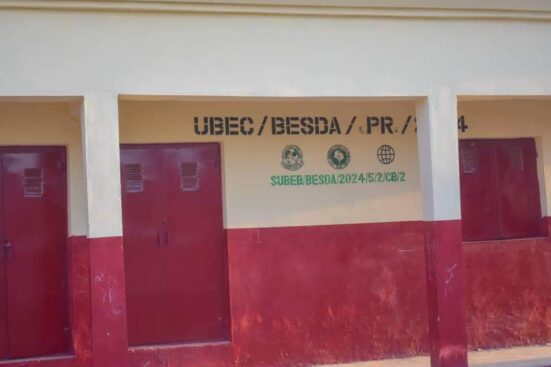
As a policy, the state government is promoting an education system that focuses specifically on empowering girl-child education as part of the Kano State development plan (KSDP). This aligns with their commitment to investing in education, for human capital development and implementing measures to increase school enrollment and promote inclusivity of the girl-child.
The KSDP data shows that girl-child has 45% attendance rate while the figure is slightly higher to 49% for the boy-child in the state, underlining a gender disparity against the girl-child in the state.
The Kano Education Sector Strategy emphasizes the importance of gender perspectives to tackling issues that hinder girl-child education by proposing actions that take into account cultural nuances and the particular obstacles girls encounter in educational settings. For example, it proposes implementing campaigns involving community and traditional leaders to promote girls’ education and dispel misunderstandings that may impede their participation.
As a pilot study to unravel impediments to girl-child education, the state launched an investigation of the educational landscape in Jemagu village in the Warawa Local Government Area.
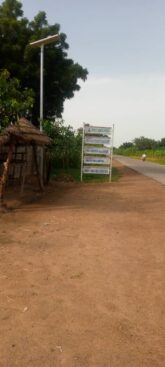
Government Initiatives and Infrastructure Improvements
In the Kano 2024 Education Sector Action Plan (AoP), the government is actively working to tackle infrastructure issues by building 130 two compartment toilets and mechanized boreholes in schools, like Jemagu to improve facilities for students and address challenges around access to water and sanitation that particularly affect girls attendanc. The AoP also contains a monitoring system put in place to make sure these facilities are maintained, addressing the common issue in rural education where infrastructure tends to deteriorate rapidly without consistent supervision.
Religion and culture play roles, in shaping the lives of individuals, especially in Kano State. Previously an effort was made to investigate how misunderstandings related to culture and religion were impeding the education of girls in this community. This investigation sparked tensions, among parents who worried that cultural norms were obstructing their daughters from finding marriage partners and clashed with the government officials.
During the inquiry process it was discovered that Government Girls Junior Arabic Secondary School Jemagu, the school, in the village for girls encountered difficulties. The restroom facilities had been out of order for a period due, to water supply. The AoP focuses on resolving issues related to water and hygiene with plans to introduce boreholes and construct restroom amenities throughout the region.
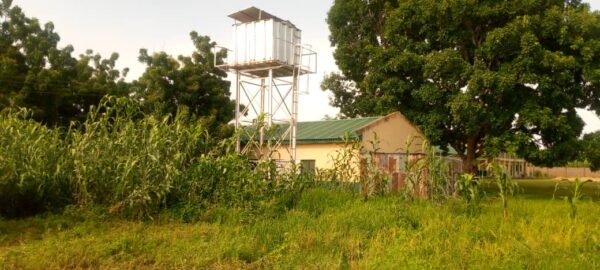
Cultural Barriers
A student, Hafsat Muhammad, shared the difficulties she encounters that hinder her to focus in school at the village level; “A major obstacle we confront in our village secondary school is that men are reluctant to marry us due to our education level.”
“They assert that our education might lead to a lack of compliance, after marriage. They even give us nicknames. Those of us who completed school and began pursuing an NCE (National Certificate in Education). They refer to us as ‘Mr. ta waye’ (too westernized girls).
“In addition; in the rainy season; numerous young girls cease attending school as they opt to assist their families in harvesting groundnuts, on the farm; some hold the belief that this labor may aid in securing a husband.”
She mentioned that she felt a lot of stress at that time but found comfort, in her parents’ support and reassurance that things would get better.
“I’m currently involved in a project distributing malaria nets along, with some job that came my way.”
The AoP discusses initiatives aimed at involving communities through activities such, as town hall gatherings to raise awareness about girls’ education issues such as hygiene and school meal programs. These community interactions play a role in breaking down obstacles similar, to those encountered in Jemagu.
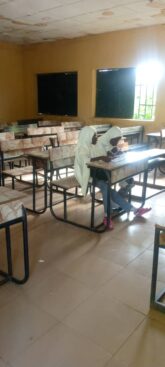
“During this time, I was much stressed, but eventually, my parents stood by me, assuring me that everything would pass,” she said.
“Now I am working on a malaria net distribution project and some other jobs that I got.”
The AoP mentions efforts to engage communities through programs like town hall meetings to promote awareness of girls’ education, addressing topics like menstrual hygiene and school feeding. This form of community engagement is critical in overcoming cultural barriers like those experienced in Jemagu.
Government Initiatives from Key Stakeholders
In a different discussions with key stakeholders, including the Commissioner of Education, Umar Haruna Doguwa, Amina Kasim, the Coordinator for Girls’ Education at the Kano State Ministry of Education, and Dr. Kabiru Ado Zakirai, the Executive Secretary of the Kano State Senior Secondary Schools Management Board (KSSSMB), mentioned that different programs to enhance girl-child education were initiated.
A key program involves the revitalization of a Conditional Cash Transfer scheme that offers girls an ATM card, for receiving payments of 20 000 Naira each to help them avoid street vending and concentrate on their studies instead. Presently more than 48,500 girls are reaping the benefits of this initiative.
Furthermore, the authorities are making efforts to reopen and upgrade a number of schools, for young ladies in places like Jogana, Gezawa and other areas to make it easier for gilrs to receive an education.
Accessibility is a concern this makes the government to introduced 72 spacious buses that run regular services exclusively for schools attended by female students to ensure they can attend school regularly. In addition, to this initiative a plan is also underway to provide one million school uniforms in order to lighten the financial load of families specially benefiting young female learners.
In her statement Amina Kasim highlighted the governments dedication to assisting girls with needs by supplying educational materials, like books, clothing and footwear. The government intends to educate girls in business related skills to boost their independence and involve parents (particularly mothers) during the training to offer indirect support, for the girls’ education.
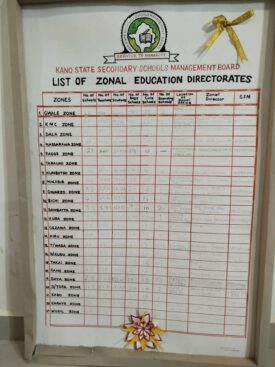
List of 23 Kano State Zonal Education
Dr.Kabiru Ado Zakirai is, in charge of supervising 813 Senior Secondary Schools spread out in the 44 government areas of the state and grouped into 23 zonal education areas. There are 445,000 students in total across these schools. 450 For girls and 363 for boys. Indicating a disparity, in school opportunities based on gender.
The KSSSMB has a workforce of around 19,000 employees, including teachers and non-teaching staff. Of these approximately 13,000 are teachers. However, the board is currently facing issues as 3,000 teachers are expected to retire by December 2024, potentially decreasing the number of teaching staff to around 10 000. This poses a challenge in terms of maintaining staffing levels. Despite recruitment efforts that saw 10,000 staff members retained from the administration and 2,500 deployed to schools, there still exists a notable shortage, in critical areas. In particular; the state is lacking 2,700 science instructors and 1,500 entrepreneurship educators, which leads to a combined deficit of approximately 5,600 teachers based on the present educational needs.
In schools, in Kano States curriculum consists of a variety of subjects covering both academic and vocational track. The addition of an entrepreneurship program highlights the importance of practical skills; however, the state must also focus on catering to the specific educational requirements. To tackle the disparities in rural education, Dr. Zakirai proposed constructing five new boarding schools in each of the 23 zonal education areas, three for girls and two for boys to enhance access to education for rural students and helps prevent early marriages. This initiative aims to alleviate the financial burden on families by reducing everyday costs associated with education. The initiative aims to create an educational environment that supports girls’ attendance, retention and academic success.
Dr. Zakirai also raised concerns about the segregation of students with special needs, proposing their integration into mainstream classes to foster a more inclusive environment. He emphasized the need for specialized teacher training to support this integration effectively. Despite the challenges, including the absence of a comprehensive educational sector plan, stakeholders are actively working on an updated version that will incorporate gender policies to address existing gaps. The state government remains committed to resolving staffing shortages and prioritizing teacher training for inclusive education.
Based on the findings from the investigation and supported by the Kano 2024 Education Sector Action Plan, it is essential to improve water and sanitation facilities in schools. The government should prioritize the completion of planned water and sanitation projects, especially in rural schools, and ensure that boreholes and toilets are functional.
Despite financial constraints and the lack of a comprehensive educational sector plan, the Kano State government is taking steps towards creating a more inclusive and equitable educational system. This includes focusing on gender-responsive policies and rural education access while continuing efforts to address the teacher shortage, particularly in specialized subjects.
Increasing the allocation of teachers in rural areas, particularly in girls’ schools, is crucial to enhancing the quality of education. Furthermore, promoting community-based programs to address cultural barriers is necessary. The government should expand community engagement initiatives, such as town hall meetings, to raise awareness and address misconceptions about girls’ education.
It is essential for the state government to establish a specific gender policy to ensure that the various strategies and interventions for girls’ education are coherent and effective. Currently, many relevant policies exist but are fragmented across different documents. Therefore, the government should work on integrating these policies to create a more unified approach to gender-responsive education.
Additionally, the state government must ensure that they adhere to their policies to evaluate whether their goals are being achieved. Monitoring and assessment frameworks should be established to track progress and outcomes related to girls’ education initiatives.

 Join Daily Trust WhatsApp Community For Quick Access To News and Happenings Around You.
Join Daily Trust WhatsApp Community For Quick Access To News and Happenings Around You.


